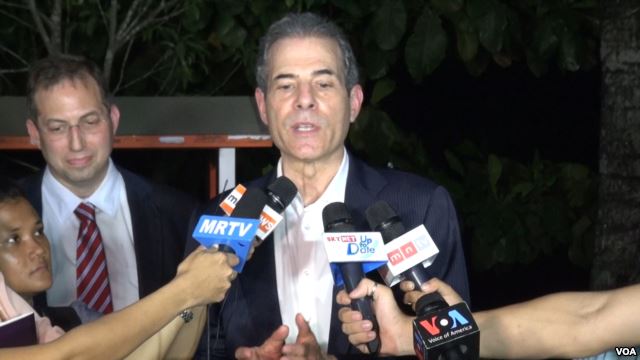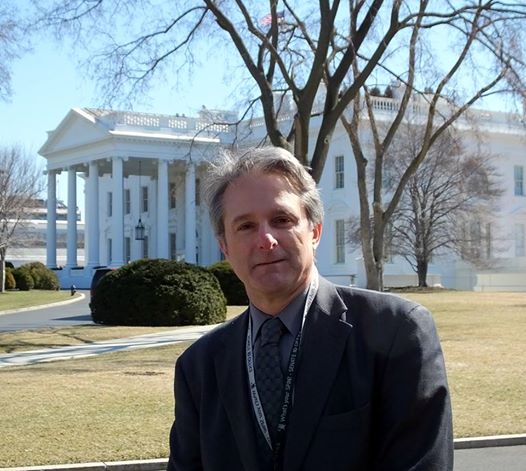OPINION – GUEST COMMENTARY
US Agency for Global Mayhem
Don’t Get Fooled – Again
By The Federalist
Originally posted on November 21, 2020 and last edited for formatting changes on February 18, 2021.
To all appearances, Joe Biden has successfully defeated Donald Trump and will be the next president of the United States.
The transition is rocky and strewn with political potholes.
The country is divided and likely to remain so, even though the Leftist media attempts to ignore just how deep the division is.
Even so, Biden and the people around him are preparing to assume the Oval Office.
Same Old, Same Old
As part of the transition effort, the Biden camp has established a team which will oversee looking into the US Agency for Global Media (USAGM). It is comprised of several individuals with previous, intimate connection to the agency. Among them:
- Richard Stengel, former Undersecretary of State for Public Diplomacy for the Obama administration
- Brian Conniff, former head of U-SAG-M’s Middle East Broadcasting Network (MBN)
- Bruce Sherman, former head of the agency’s “strategic planning” operation
Although not formally named as part of the transition team, it is reasonable to include Ted Kaufman, former chief of staff for then-Senator Biden, former member of the Broadcasting Board of Governors (BBG) and a past senator of the state of Delaware. We suspect Kaufman will wield considerable influence on the transition team and by extension the doings of the agency itself.
Let’s go over some of what we know of the three members of the transition team:
Richard Stengel
Mr. Stengel has the distinction of serving 34 months as Undersecretary of State for Public Diplomacy, the longest of 13 undersecretaries who have held the post since it was created in 1999.
Mr. Stengel also authored a book on his experiences in the position:
INFORMATION WARS: How We Lost the Global Battle Against Disinformation and What We Can Do About It. 357 pp. $28
Reviewed in the Washington Post by James Mann, Sunday, November 27, 2019
A couple of interesting things come out of the review recounting Mr. Stengel’s experiences in the post:
“Virtually any new initiative from his bureau had to be cleared with various other branches of the State Department.”
Mr. Stengel will feel right at home with USAGM where decisions are made by committee, with a host of signoffs by various bureaucrats. How the signatories come about depends on the issue at hand. But it is also a useful device in making everyone a party to a decision and less likely to break ranks if the decision proves faulty. United to the end, even if it results in a crash landing.
Perhaps even more prophetic is the following, quoting Mr. Stengel,
“The plain truth is that people are going to believe what they want to believe.”
This becomes singularly important considering later statements attributed to Mr. Stengel:
Stengel has come under scrutiny in recent days for comments on what constitutes the right of free speech. An interesting article on the subject comes from the website reclaimthenet.org:
Tom Parker, “Joe Biden’s top state media transition lead supports ‘hate speech’ laws and rethinking the First Amendment,” ReclaimTheNet. org, November 16, 2020
Richard Stengel: “I actually having once been almost a First Amendment absolutist, I’ve really moved my position on it because I just think for practical reasons and for society we have to kind of rethink some of those things.”
Richard Stengel in “Political Disruptions: Combating Disinformation and Fake News” YouTUbe Video, Council on Foreign Relations, May 3, 2018
RT (Russia Today) has also jumped on Stengel’s statements, not unexpectedly with their own hypocritical angle.
Even if one chooses the dismiss the conservative website and RT, Stengel’s words cannot be ignored.
Stengel seems to believe that the First Amendment is not an absolute. He appears to believe that news and information can be censored or otherwise manipulated. These views are consistent with what we have seen from major media outlets over the past four years. Journalism has been replaced by ideological advocacy. It appears that Stengel wants to visit this upon the USAGM entities. Indeed, the groundwork may have already been laid by Obama loyalists who encumbered senior holdover appointments to the Voice of America, during the Trump administration. What we have seen is a VOA newsroom populated with anti-Trump haters. These are wannabe media types who mimic what the major media has been doing while Trump has been in office.
The deeper issue is the impact of these statements on how USAGM broadcasts are perceived by global publics.
On its face, Stengel’s comments run afoul of the VOA Charter which states in part,
“1. VOA will serve as a consistently reliable and authoritative source of news. VOA news will be accurate, objective, and comprehensive.”
To appearances, what Stengel’s remarks indicate is accuracy and objectivity taking a back seat to propaganda as a priority.
As Mr. Stengel also observed in his book,
“The plain truth is that people are going to believe what they want to believe.”
This quote serves as a useful definition of “confirmation bias.” If indeed Stengel’s remarks are promoting propaganda, that is what people will see these broadcasts as.
Keep in mind that VOA, while ostensibly prohibited from broadcasting within the United States to the US public, is accessible domestically via the agency’s websites, YouTube and Facebook posts. Consequentially VOA is already engaged in domestic propaganda, sort of a fellow traveler to US big media, and might become even more so if the Stengel model is adopted.
Propaganda is an integral part of a cycle that includes censorship, suppression, authoritarianism and ultimately totalitarianism. We have already seen elements of this trend in US society and big media, along with revisionists embracing the cancel culture. We are in a very dangerous period.
Aside from his remarks, Mr. Stengel should remember that the agency has been described by former Republican chairman of the House Foreign Affairs Committee Ed Royce as “dysfunctional” and as “practically defunct” by Hillary Clinton when she was Secretary of State in 2013. If the agency was bad then, you can be assured that it is much worse now, without regard to the self-serving pronouncements from agency officials about audience gains and views on the Internet.
These claims are preposterous. They are laughable. The agency clearly has no impact and effectiveness without regard to the boasting of views on the Internet. The agency’s internet claims are akin to millions of hits on cat videos. To what end?
The agency habitually rolls out its claims in the interest of self-preservation and justification for its existence, especially when there is a new administration on the horizon and/or the annual budget cycle of proposal, appropriation and authorization is at work. The Congress and the administration keep this agency on fiscal life support simply because it is not worth any political investment, when the appropriate thing to do is to transfer its functions, substantially reorganize it or eliminate it altogether.
As to some other members of the transition team:
Bruce Sherman once directed the agency’s “Strategy and Policy” Office. A lofty title indeed. Sherman was known for rolling out “five-year plans,” ironically replicating the mindset of the former Soviet Union. As was once remarked by an associate, “Five-year plans didn’t work for the Soviets and they won’t work for this agency.”
Around Sherman’s time, the agency spent millions contracting with the Gallup organization to divine an effective strategy.
It didn’t happen.
What did happen:
“Dysfunctional” and “practically defunct.”
Burce Sherman commissioned and promoted in 2014 a public opinion poll in Russian-occupied Crimea which was criticized for helping disinformation by Russian officials and the Kremlin’s state media propagandists.
Clearly what comes out of this exercise is that the agency is essentially lost in contemporary times, incapable of mission effectiveness in an era of exponential media growth across the globe, competing against others who know their audiences and helping people “believe what they want to believe.”
Thus, good-bye Mr. Sherman and others who followed in his place including Haroon Ullah, a favorite of Mr. Stengel’s (getting praised in Stengel’s book for being his indispensable advisor) who positioned himself in the agency’s “strategy” effort under former Broadcasting Board of Governors CEO, John Lansing (now in charge of NPR), and who disgraced himself by being convicted of embezzling agency funds and serving a prison sentence.
Brian Conniff is a onetime head of the agency’s Middle East Network (MBN) comprised primarily of Radio Sawa and Alhurra television.
We look at MBN is a kind of exercise in futility: the late comer to over two thousand years of Middle East history trying to convince a region with cross purposes and allegiances that the US is going to solve centuries of suspicion, distrust and violence.
Not going to happen, at least not according to the USAGM model.
What Conniff brings to this already broken agency in general or MBN specifically is anyone’s guess. But one shouldn’t hold their breath. There are no miracles to be worked here. There may be lofty pontifications but at the end of the day, they don’t really mean much and perhaps mean nothing at all. The Middle East makes its own path.
Last, we should give the presumptive president-elect a mention.
Robert Gates, a past CIA Director and Secretary of Defense published his memoirs in 2014 (“Duty,” Alfred A Knopf Publisher). Joe Biden is featured throughout various chapters of the book. Gates has many nice things to say about Biden the man. However, Gates also observes,
“…I think he has been wrong on nearly every major foreign policy and national security issue over the past four decades…”
Does this inspire confidence?
For those who have bought into the Biden agenda, whatever it may be,
“Be careful what you wish for. You might get it.”
Sideshow: Sliding Backwards Resolutely
The Hill website has posted a new op-ed article from Kim Andrew Elliott, a former agency employee (analyst):
Mr. Elliott returns to a favorite topic inside the Cohen Building:
The “firewall.”
“To be or not to be. That is the question.” We’re not sure if Elliott himself knows the answer.
The notion of a “firewall” is inconsistent with provisions of the VOA Charter. The concept of the firewall was intended to provide some measure of hands-off distance between the agency on the one hand and the administrations occupying the White House and even Members of Congress on the other with regard to the agency’s broadcast content.
In practice, the “firewall” has devolved into a means of obstruction: namely, turning a “hands-off” concept into one in which there is no accountability for what the agency produces in the way of news content or coverage.
This is patently absurd. This is an agency of the Federal Government. It is wholly accountable to taxpayers for what it does, does not do, or abuses its authorities and responsibilities.
It has been demonstrated repeatedly by BBG – USAGM Watch that the agency has become a mirror image of big media, has embraced a Leftist, anti-Trump political bias and some selective reporting or non-reporting. Clearly, content balance has become a thing of the past reinforced in the hands of Obama-era appointees and continuing unchecked even with Trump-appointed and Senate-confirmed Michael Pack as CEO since June 2020.
Elliott correctly observes that Biden has had a hand in the agency’s legislative history. But even more so, Ted Kaufman, a former Biden chief of staff, member of the former Broadcasting Board of Governors (BBG) and a former Delaware senator has been an active representative of Biden’s interests in the agency.
Elliott appears to believe that Biden is going to come to the rescue of the agency, starting with the firing of current CEO, Michael Pack. That is a likely possibility, if Pack doesn’t have the sense to resign before or at the time of the inauguration, as is customary when administrations change, although it did not happen with former BBG/USAGM CEO John Lansing and former VOA director Amanda Bennett. They stayed on for three years into the Trump administration. Under the current legislation, Pack has a three-year term, but there will be tremendous pressure on him to resign. Raging media Leftists will demand it.
But then Elliott goes off into a dreamscape in revisiting the former BBG as a management oversight body:
“It may be years before such a bipartisan board can be restored, it having been dissolved just months ago. In the meantime, Biden could create an advisory panel. It would consist of respected journalists and media executives, with international experience, representing a spectrum of political orientations. Such a panel would be better off without commentators, pundits, political strategists and public relations flacks, as important as those professions are. Members should not be so high in their corporate management chains that they don’t have time to attend meetings or to participate in the work of the board.”
Oh no, not another advisory board.
Our response to this Elliott idea:
Dream on.
The board was a disaster, often divided into minor fiefdoms of interests among the board governors, sometimes conspiring to undermine the sitting board chairman and generally contributing to the agency’s overall dysfunction and all the while being played by the agency’s bureaucrats on the lookout for anything that might upset business as usual.
For Elliott it seems perfectly fine to revisit this nightmare.
Elliott also does not take into consideration that the people sitting on the board were usually extreme partisans and donors to the president’s election. Most of them were not guardians of journalistic integrity. They were usually not lightweights. They were partisans. They had a large dose of personal ego juxtaposed to each other.
It’s a ridiculous, naïve suggestion from Kim Andrew Elliott.
Not only that…
Elliott needs to consider Stengel’s views toward the abridging the First Amendment, his views toward propaganda, censorship and the like.
Whoever inherits the nearly impossible position of agency CEO will have to meet a litmus test established by Stengel, Kaufman and others.
Elliott also thinks “it may be years before such a bipartisan board can be restored…”
Let’s put it this way:
This agency doesn’t have years to do anything other than slip further into irrelevance. At present it is little more than a parasitic wreck, siphoning off millions of taxpayer dollars every year and having little of lasting impact or effectiveness to show for it. Recovery is not something to be seen in this lifetime or the next.
Elliott and others of similar ilk persist in trying to preserve a faulty, spotty agency legacy, now lost below the radar in contemporary times. The best decision may well be the one no one faces up to:
Do something else or put an end to its moribund existence.
The Federalist
November 2020










